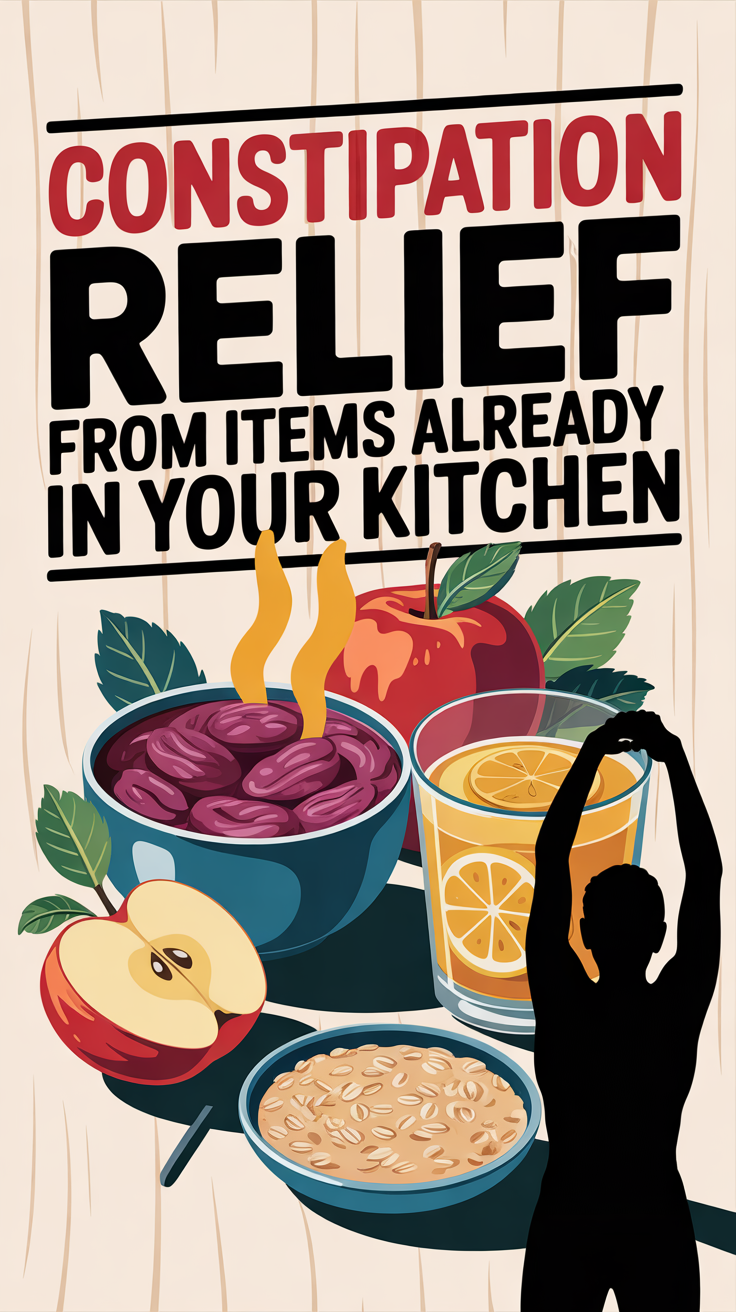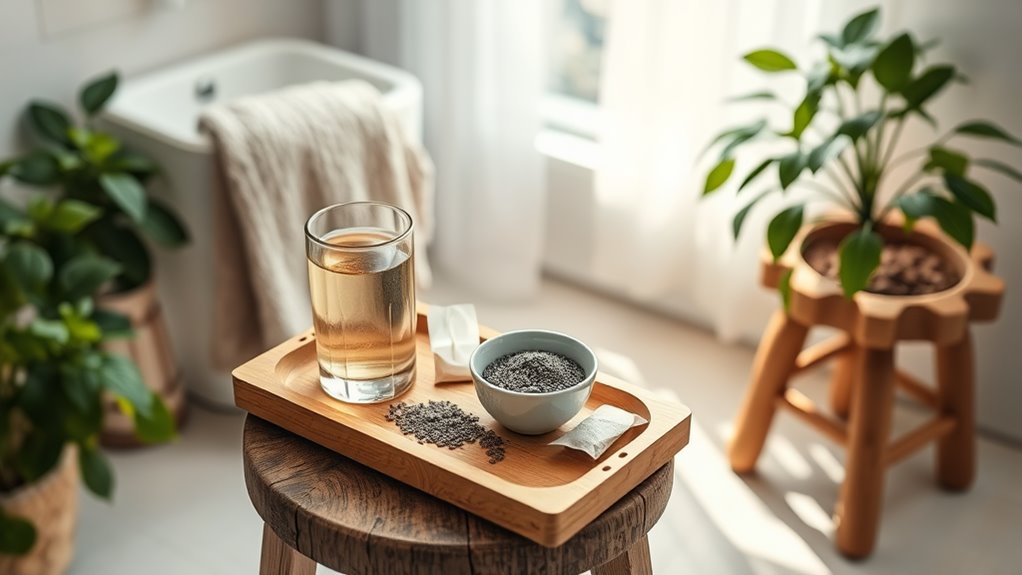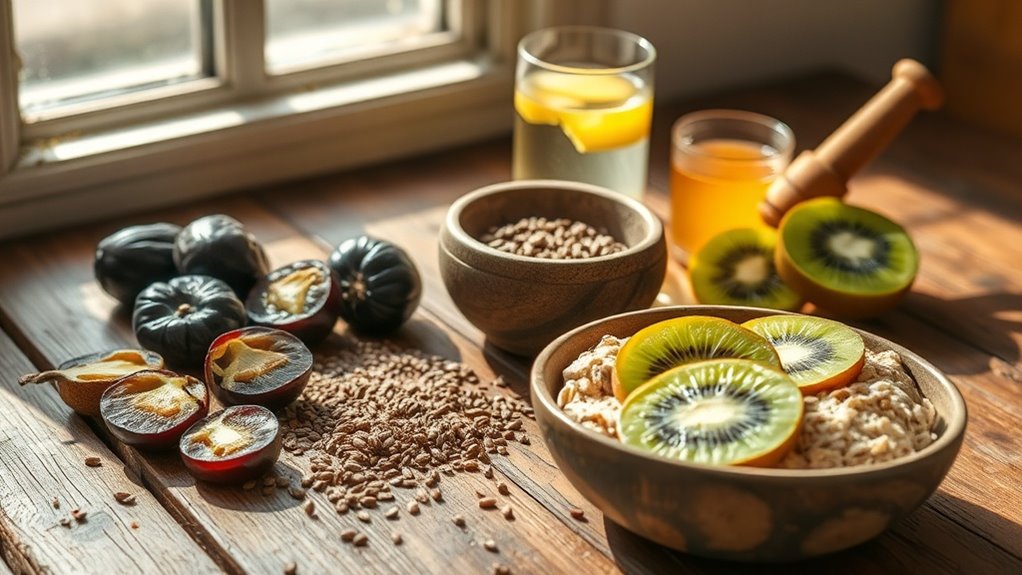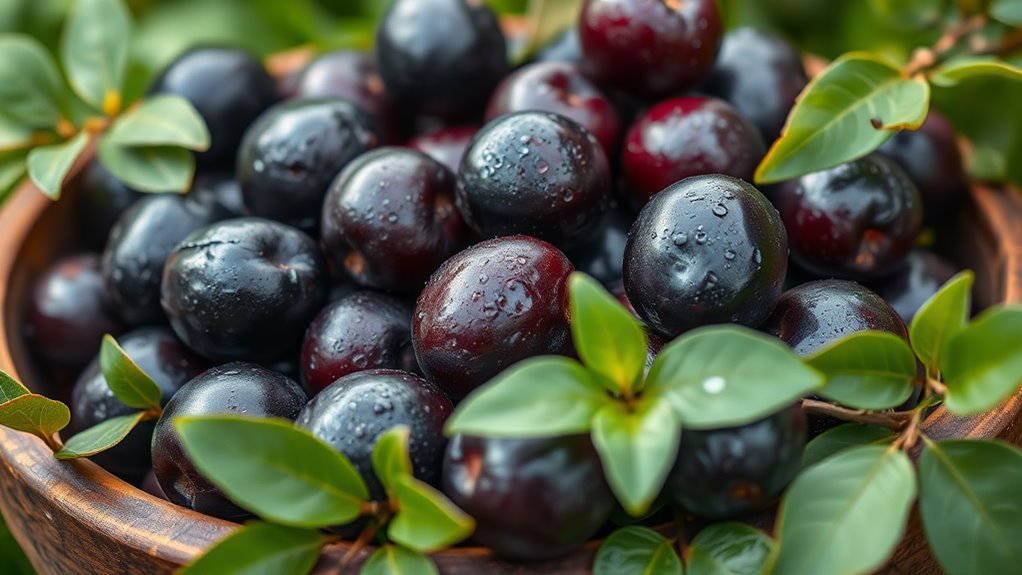Constipation Relief From Items Already in Your Kitchen
You can find effective constipation relief using common kitchen ingredients backed by research. Prunes, figs, and dates contain natural fiber and sorbitol that add bulk and soften stools, while herbal teas like peppermint and ginger stimulate digestive processes. Mixing ground flaxseeds or chia seeds into your meals provides additional fiber, and staying hydrated with warm water helps activate gut muscles. These evidence-based solutions offer multiple approaches to restore healthy bowel movements.
Key Takeaways
-
Mix olive oil with orange juice to naturally lubricate intestines and promote bowel movements.
-
Brew ginger, peppermint, or chamomile tea using fresh or dried herbs to stimulate digestive processes.
-
Combine warm water with lemon juice on an empty stomach to activate gut muscles.
-
Create a fiber-rich mixture of applesauce, oat bran, and prune juice for effective constipation relief.
-
Blend honey with warm water to provide prebiotic support and encourage beneficial bacteria growth.
Why Natural Kitchen Remedies Work for Constipation
Ever wondered why kitchen remedies are so effective against constipation? The science behind these natural solutions lies in their ability to work with your body’s digestive processes. Natural constipation remedies contain fiber-rich components that add bulk to your stool, making elimination easier and more regular.
Studies show that 77% of patients with chronic constipation see improvement from using fiber-based remedies. Your kitchen’s natural solutions offer multiple mechanisms of action. They stimulate gut motility, support your microbiome’s healthy bacteria balance, and often provide natural stool-softening effects. Fiber-rich foods play a crucial role in this process.
Unlike synthetic laxatives, these remedies are generally safer for regular use and offer additional health benefits through their antioxidant properties. You’ll also find they’re readily accessible and cost-effective, making them practical first-line options for managing constipation.
Their effectiveness stems from working holistically with your digestive system rather than forcing artificial changes.
Common Pantry Ingredients That Act as Natural Laxatives
You’ll find powerful natural laxatives in dried fruits like prunes, figs, and dates, which contain both fiber and sorbitol to promote bowel movements. Incorporating magnesium-rich foods into your diet can also enhance bowel movement stimulation. Many herbal teas, including peppermint, ginger, and chamomile, can stimulate digestive processes while providing necessary hydration for smoother elimination. When you combine these with other fiber-rich pantry staples like chia seeds or ground flaxseeds, you’re creating a natural approach to constipation relief that’s backed by nutritional science. Adding just one ounce of chia seeds provides 9.6 grams of fiber to help soften stools naturally.
Dried Fruits Power Movement
Looking for a natural solution to constipation?
Your pantry’s dried fruit collection might hold the key to relief.
Prunes, figs, dates, apricots, and raisins contain powerful compounds that promote healthy bowel movements.
These fruits work through two main mechanisms: fiber and sorbitol.
The fiber adds bulk to your stool and supports gut motility, while sorbitol, a natural sugar alcohol, draws water into your intestines to soften stools.
A quarter cup of prunes provides about 3 grams of fiber, making them particularly effective.
Experts recommend that you ensure portion control when consuming dried fruits due to their high caloric content.
To maximize benefits, pair dried fruits with adequate hydration and watch portion sizes, as they’re calorie-dense.
Choose options without added sugars, and consider combining them with other high-fiber foods for enhanced effectiveness.
You’ll support both your digestive health and gut microbiome balance.
Tea and Herbs Help
Natural remedies for constipation can be found steeping in your teacup, with several common herbs and teas offering effective relief.
Senna tea stands out as a potent natural laxative, while ginger and peppermint teas can ease associated cramping and digestive discomfort.
You’ll find powerful digestive aids in your spice rack too.
Fennel seeds, often featured in digestive tea blends like Smooth Move, help stimulate bowel movements. Recent studies showed that fennel tea combined with rose tea produced effects like medications for constipation relief.
Fresh or dried ginger root and licorice root can be steeped alone or combined for enhanced effects.
When incorporating these remedies, start with small amounts and increase gradually while maintaining proper hydration.
Remember to pair these teas with a fiber-rich diet for optimal results.
If you’re pregnant, nursing, or taking medications, consult your healthcare provider before using herbal laxative teas.
Fruits and Vegetables You Should Always Keep Stocked
You’ll find that both fresh and frozen fruits and vegetables offer comparable nutritional benefits for constipation relief, with frozen options often being more convenient and cost-effective. Fiber-rich foods play a crucial role in promoting regular bowel movements, and incorporating a variety of these into your diet can further enhance digestive health.
Adequate hydration is essential when consuming fruits and vegetables to help them work effectively for digestive health.
For quick preparation, you can steam frozen vegetables like broccoli or Brussels sprouts in minutes, while fresh berries and citrus fruits require minimal prep beyond washing.
Whether you choose fresh leafy greens or frozen peas, maintaining a stock of fiber-rich produce ensures you’ve got natural digestive support readily available in your kitchen.
Fresh Vs Frozen Options
When it comes to stocking your kitchen with constipation-fighting foods, both fresh and frozen fruits and vegetables offer powerful digestive benefits.
Fresh options like kiwifruit contain actinidin for improved gut motility, while broccoli provides 5g of fiber per cup.
Fresh collard greens deliver an impressive 8g of dietary fiber per serving.
Don’t underestimate frozen alternatives, though.
They retain similar nutritional profiles to their fresh counterparts, thanks to flash-freezing methods.
You’ll find that frozen berries maintain their fiber content and antioxidants, while frozen vegetables like peas still provide both soluble and insoluble fiber.
The key advantage of frozen options is their year-round availability and extended shelf life, helping you maintain consistent access to fiber-rich foods for digestive health.
Quick Preparation Methods
Having essential fruits and vegetables readily available in your kitchen can make a significant difference in managing constipation.
You’ll want to focus on items that are easy to prepare and offer maximum digestive benefits.
Select produce rich in fiber, water content, and natural compounds that support bowel regularity.
- Keep apples and pears on hand – simply wash and eat for immediate fiber intake
- Stock broccoli florets that you can quickly steam for sulforaphane benefits
- Maintain a supply of citrus fruits, which contain beneficial pectin and naringenin
- Have ready-to-eat berries for their high fiber and water content
- Store pre-washed leafy greens like collards that you can quickly sauté or add to smoothies
These items require minimal preparation while delivering maximum digestive support through their fiber content and bioactive compounds.
Power-Packed Beverages for Quick Relief
Seeking relief from constipation doesn’t require a trip to the pharmacy when powerful beverages from your kitchen can help. You’ll find effective options in both hot and cold drinks that stimulate your digestive system.
Start your day with 8 ounces of warm water or coffee to activate your gut muscles.
Throughout the day, aim for 12 glasses of water to keep stools soft and movable.
For targeted relief, try prune juice, which delivers 2.6 grams of fiber per serving plus natural sorbitol to draw water into your intestines.
You can also brew ginger, mint, or senna tea for gentle stimulation of bowel movements.
For a potent natural remedy, mix aloe vera juice with lemon juice and drink on an empty stomach. These beverages work through different mechanisms to promote healthy bowel function, highlighting the importance of proper hydration to maintain soft stools.
Essential Kitchen Staples for Better Digestion
A well-stocked kitchen doubles as a natural pharmacy for digestive health when you know which ingredients to keep on hand.
Your pantry’s digestive allies work through different mechanisms: some provide essential fiber, others deliver gut-healthy fats, while certain items support beneficial bacteria growth.
By combining these staples strategically, you’ll create a powerful arsenal against constipation.
- Keep EVOO and coconut oil in your pantry – their healthy fats aid nutrient absorption and support digestive health.
- Stock beans and lentils for their high-fiber content that promotes regular bowel movements.
- Include ginger and turmeric in your spice rack for their anti-inflammatory properties.
- Store honey and maple syrup as natural prebiotic sources.
- Maintain a supply of chia seeds and whole grains for consistent fiber intake.
Incorporating probiotic-rich foods into your diet can also enhance gut health and prevent future digestive issues.
Simple Recipe Combinations for Maximum Effect
When you combine specific kitchen ingredients strategically, their digestive benefits multiply beyond their individual effects.
For optimal results, mix prunes with yogurt and granola, creating a powerful combination of probiotics and natural laxatives.
You’ll boost effectiveness by blending papaya with ground flaxseeds, which provides both soluble and insoluble fiber.
For a fiber-rich solution, combine apple sauce with oat bran and a splash of prune juice.
This mixture delivers multiple forms of fiber while the sorbitol from prunes helps soften stool.
Another potent combination pairs stewed apricots with psyllium seeds, creating a gentle yet effective digestive aid.
Incorporating these combinations can help reduce bloating and enhance overall digestive health.
Remember to introduce these combinations gradually and drink plenty of water to maximize their benefits and prevent digestive discomfort.
Daily Kitchen Habits for Prevention
Consistently practicing smart kitchen habits can prevent constipation before it starts.
You’ll find that integrating specific dietary choices and timing into your daily routine helps maintain regular bowel movements.
By focusing on hydration, fiber-rich foods, and proper meal timing, you’re setting yourself up for digestive success.
- Start your day with warm water or clear broth to stimulate intestinal motility.
- Include a fiber source in every meal, mixing fruits, vegetables, and whole grains throughout your day.
- Keep a water bottle nearby and aim for 2.5 liters daily, supplementing with natural fruit juices.
- Choose smaller, frequent meals instead of large portions to prevent digestive sluggishness.
- Replace processed snacks with fiber-rich options like apples, pears, or cucumber slices. Additionally, incorporating probiotic-rich foods can promote gut health and improve digestion, further aiding in constipation relief.
When to Use Kitchen Remedies vs. Seeking Medical Help
Understanding the line between kitchen remedies and professional medical care is crucial for managing constipation safely and effectively. You can rely on kitchen remedies like prune juice, olive oil, and fiber-rich foods when you’re experiencing mild, short-term constipation with soft but infrequent stools.
However, you’ll need to seek immediate medical attention if you’re experiencing severe abdominal pain, blood in stools, or constipation lasting more than three weeks. Don’t attempt to self-treat with kitchen remedies if you have underlying health conditions like diabetes or thyroid disorders.
Watch for warning signs such as persistent pain during bowel movements, significant bloating, or feelings of incomplete evacuation. Additionally, be cautious as severe symptoms like fever may indicate more serious underlying conditions that require urgent medical evaluation.
Remember that while kitchen remedies can help with prevention and mild cases, they shouldn’t replace professional medical care when symptoms are severe or chronic.
References
- https://www.healthline.com/health/digestive-health/homemade-laxative-recipes
- https://www.medicalnewstoday.com/articles/318694
- https://www.bladderandbowel.org/bowel/bowel-treatments/8-remedies-to-relieve-constipation-bladder-bowel-community/
- https://www.hopkinsmedicine.org/health/wellness-and-prevention/foods-for-constipation
- https://www.piedmont.org/living-real-change/5-foods-that-relieve-constipation
- https://www.medicalnewstoday.com/articles/320940
- https://www.katygastrodoctor.com/blog/6-effective-remedies-to-cure-constipation-naturally/?bp=33877
- https://www.healthline.com/nutrition/20-natural-laxatives
- https://www.health.com/natural-laxatives-7560535
- https://draxe.com/nutrition/natural-laxatives/








